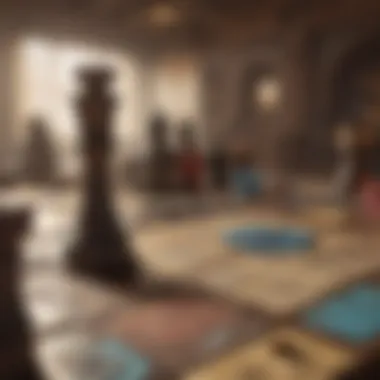Immerse in the World of Two-Player Board Games: A Curated Selection


Overview of Great Board Games for Two Players
As we delve into the realm of board games crafted exclusively for two players, a vast array of immersive gaming experiences awaits. From strategic masterpieces to cooperative challenges, these games have been intricately designed to elevate the gaming dynamics between duos. This curated selection aims to cater to a variety of gameplay preferences, ensuring that players can engage in stimulating and captivating sessions that enhance their strategic thinking and collaborative skills.
Best Pick: Strategy Showdown
One standout game in this selection is 'Strategy Showdown,' a game that tests players' tactical acumen and decision-making prowess. With a blend of intricate planning and calculated moves, 'Strategy Showdown' offers an intense and intellectually stimulating gaming experience for two players. Whether you enjoy outwitting your opponent or devising complex strategies, this game promises to immerse you in a world of strategic challenges.
Key Features:
- Strategic Depth: Dive into a rich gameplay experience that requires foresight and planning.
- Dynamic Scenarios: Encounter ever-evolving scenarios that challenge your strategic thinking.
- Immersive Gameplay: Engage in a captivating gameplay environment that keeps you on the edge of your seat.
Cooperative Adventure: Teamwork Triumph
For those seeking collaborative gameplay, 'Teamwork Triumph' stands out as an exceptional choice. This game emphasizes the importance of teamwork and communication, requiring players to coordinate their actions effectively to achieve shared objectives. With engaging challenges that foster cooperation and synergy, 'Teamwork Triumph' offers a gaming experience that strengthens bonds and encourages strategic collaboration.
Key Aspects:
- Shared Goals: Work together with your partner to accomplish common objectives and overcome obstacles.
- Communication Focus: Emphasize effective communication and coordination to succeed in your endeavors.
- Synergistic Gameplay: Experience the power of synergy as you combine your strengths and strategies.
Concluding Thoughts
Introduction
In the realm of board gaming, the landscape becomes infinitely more intriguing when focusing on the niche of two-player games. This segment presents a unique amalgamation of strategic depth and intimate player interaction. A significant aspect of this article revolves around the exploration of board games tailored specifically for two players, highlighting their nuances, challenges, and immersive experiences.
Drawing the focus onto two-player games unveils a dynamic where every move carries weight, every decision holds significance, and every strategic juncture unfolds with palpable anticipation. Unlike games catering to larger groups, two-player board games offer a concentrated experience that is not diluted by the complexities of multiple participants. This setting allows for a deeper exploration of tactics, a more intimate player engagement, and a heightened sense of competitive spirit between two individuals.
The prevalence of two-player board games underscores a paradigm where quality outweighs sheer quantity. Each game included in this article embraces a deliberate design ethos to cater specifically to the dynamics of duet play, offering a tailored and finely honed experience. By emphasizing the significance of targeted game design, this article aims to showcase how two-player games stand as a testament to the versatility and innovation present in the board gaming sphere.
Exploring the rich tapestry of two-player board games opens up avenues for strategic creativity, critical thinking, and immersive gameplay experiences. This article serves as a guiding light for enthusiasts looking to delve into a curated selection of premium games that epitomize the essence of strategic challenge, cooperative play, and innovative game mechanics. Let us navigate through this compendium of gaming marvels, each offering a unique lens into the world of two-player board gaming excellence.
Classic Board Games
Classic board games hold significant importance in this curated selection of top-tier board games for two players. These games, such as Chess and Backgammon, stand the test of time due to their strategic depth and engaging gameplay. Their historical significance and enduring popularity make them a pillar of the board gaming world.
Chess
Gameplay Overview
Chess, with its rich history dating back centuries, offers a gameplay overview centered around two players competing in a battle of wits on a checkered board. The objective is to checkmate the opponent's king while strategically maneuvering various pieces across the board. This aspect of Chess highlights the game's complexity and the critical thinking skills required to outmaneuver the other player. The strategic placement of pieces, ranging from pawns to the powerful queen, creates a dynamic and challenging gaming experience.


Strategy and Tactics
The heart of Chess lies in its emphasis on strategy and tactics. Players must not only think several moves ahead but also anticipate their opponent's potential responses. This constant mental engagement enhances cognitive skills, pattern recognition, and decision-making abilities. The intricate balance between offensive and defensive maneuvers adds layers of depth to the gameplay, ensuring that no two matches are alike.
Endgame Scenarios
As Chess matches progress, players inevitably reach endgame scenarios that demand precision and foresight. Endgame strategies in Chess focus on converting advantages into tangible victories while avoiding potential pitfalls. Mastery of endgame scenarios requires a deep understanding of piece values, pawn promotion, and king positioning. Navigating these critical moments can lead to thrilling comebacks or decisive victories, showcasing the enduring appeal of Chess.
Backgammon
Rules of Play
Backgammon, a game of chance and skill, involves moving pieces based on dice rolls within the constraints of the board's layout. Understanding the rules of play in Backgammon is essential for navigating strategic decisions and optimizing piece movement. The balance between calculated moves and adapting to uncertain outcomes adds a challenging yet captivating element to the game.
Dice Rolling Dynamics
Central to Backgammon are the dice rolling dynamics that introduce an element of randomness to each turn. Players must adjust their strategies based on the dice outcomes, showcasing adaptability and quick thinking. The interplay between strategy and chance keeps each game fresh and exciting, offering players a dynamic experience with each playthrough.
Bar and Bearing Off
The bar and bearing off mechanics in Backgammon add a layer of complexity to the endgame phase. Players aim to bear off their pieces from the board while strategically blocking their opponent's progress. This phase requires careful planning, risk assessment, and adaptability to changing board positions. The bar and bearing off aspect of Backgammon highlights the importance of timing and calculated risk-taking in securing victory.
Modern Strategy Games
Modern Strategy Games play a crucial role in this article, offering a contemporary twist to traditional board game experiences. These games stand out for their intricate gameplay mechanics, strategic depth, and immersive storytelling elements. By exploring Modern Strategy Games, players can delve into complex decision-making scenarios, challenge their strategic thinking skills, and engage in rewarding competitive experiences. Each game in this category presents a unique set of challenges and opportunities, catering to players seeking intellectually stimulating and immersive gameplay.
Patchwork
Quilt Building Mechanics
Quilt Building Mechanics form the backbone of Patchwork, contributing to its engaging gameplay and strategic depth. Players strategically piece together patchwork quilts using various Tetris-like shapes, carefully selecting pieces to optimize their quilt's size and scoring potential. This mechanic not only tests spatial awareness and planning but also introduces a creative element to the gameplay, making each decision significant and rewarding. The unique aspect of Quilt Building Mechanics lies in its balance of simplicity and complexity, offering both casual and seasoned players a compelling gameplay experience. While the mechanic provides strategic depth and player agency, mastering it requires careful planning and foresight, adding layers of tactical decision-making to the overall gaming experience.
Tile Placement Strategy
In Patchwork, Tile Placement Strategy plays a critical role in shaping players' quilt layouts and maximizing scoring opportunities. Players must strategically choose and place tiles on their quilts to fill gaps efficiently and accrue points. This aspect of the game challenges players to think ahead, anticipate their opponent's moves, and adapt their strategies accordingly. The key characteristic of Tile Placement Strategy in Patchwork is its blend of immediate gratification and long-term planning, offering players a mix of tactical decisions and strategic foresight. While the mechanic rewards clever tile placement and efficient quilting, it also introduces a level of spatial optimization that adds depth and replay value to each session.
Scoring System
The Scoring System in Patchwork serves as a vital aspect of the game, determining the players' success based on their quilt constructions and efficiency. Points are awarded for completed patches, gaps filled, and negative spaces minimized, encouraging players to optimize their quilts for maximum scoring potential. This mechanic adds a layer of competitiveness and foresight to the gameplay, as players strategize not only for immediate point gains but also for long-term scoring opportunities. The unique feature of the Scoring System lies in its balance of short-term gains and long-term planning, creating a dynamic and engaging scoring dynamic that keeps players invested throughout each game. While mastering the Scoring System requires strategic decision-making and adaptability, it rewards players with a sense of accomplishment and progression.
Wonders Duel
Ancient Civilization Theme


The Ancient Civilization Theme in 7 Wonders Duel immerses players in a rich historical setting, where they compete to build legendary civilizations and outmatch their opponents. This thematic element adds depth and narrative immersion to the gameplay, inviting players to strategize not only for victory but also for historical significance. The key characteristic of the Ancient Civilization Theme is its blend of thematic storytelling and strategic gameplay, offering players a unique balance of historical context and competitive challenge. While the theme enhances the overall game experience, it also provides players with a deeper appreciation for the strategic decisions and historical references embedded within the gameplay.
Card Drafting Dynamics
The Card Drafting Dynamics in 7 Wonders Duel introduce a dynamic and strategic element to the game, where players must strategically select cards to build their civilizations and thwart their opponent's progress. This mechanic challenges players to assess card values, anticipate opposing strategies, and adapt their gameplay accordingly. The key characteristic of Card Drafting Dynamics is its emphasis on player agency and adaptability, allowing individuals to craft unique civilization paths and pursue diverse victory strategies. While the mechanic requires careful consideration and tactical planning, it rewards players with a sense of strategic prowess and satisfaction as they outmaneuver their opponents.
Wonder Construction
Wonder Construction in 7 Wonders Duel offers players the opportunity to construct legendary wonders from antiquity, each providing unique benefits and advantages during the game. Players must carefully choose which wonders to build, strategically timing their constructions for maximum impact and strategic advantage. This aspect of the game introduces a layer of long-term planning and decision-making, as players must balance wonder construction with other strategic priorities. The unique feature of Wonder Construction lies in its blend of immediate benefits and long-term strategy, offering players a mix of short-term advantages and future planning considerations. While mastering Wonder Construction demands strategic foresight and adaptability, it opens up avenues for varied gameplay strategies and engaging gameplay experiences.
Cooperative Board Games
Cooperative board games hold a significant position in the realm of gaming, offering a unique collaborative experience where players work together towards common goals rather than competing against each other. In the context of this article focusing on great board games for two players, exploring cooperative games provides an opportunity for duos to strategize together, share victories, and experience challenges unified against the game itself. The allure of cooperative board games lies in fostering teamwork, communication, and mutual problem-solving, enhancing the overall gaming experience. Players get to enjoy a sense of camaraderie and shared accomplishment, making cooperative board games a compelling choice for those seeking a more collaborative and immersive gameplay dynamic.
Pandemic
Disease Control Objectives
Disease control objectives within Pandemic introduce an intense strategic element where players must work together to contain and eradicate virulent diseases spreading across the globe. The core objective revolves around coordinating actions to prevent outbreaks, research cures, and manage limited resources efficiently. This aspect adds a challenging yet engaging dimension to the gameplay, requiring players to prioritize tasks, strategize effectively, and adapt to unforeseen developments. The emphasis on disease control objectives not only tests players' tactical skills but also encourages thoughtful decision-making and communication within the team, offering a holistic gaming experience that blends tension with cooperation.
Role Specializations
Role specializations in Pandemic diversify gameplay by assigning unique abilities and responsibilities to each player, promoting strategic variety and cooperation. By embodying different roles such as Medic or Researcher, individuals contribute distinct strengths crucial to the team's success. This feature encourages players to optimize their roles, leverage specialized skills, and synergize efforts towards common objectives. Role specializations foster a sense of individual contribution within a collaborative framework, enhancing replay value and depth of strategy in each session. The ability to combine different roles strategically underscores the cooperative essence of the game, making it a dynamic and captivating choice for duo players.
Crisis Management
Crisis management in Pandemic encapsulates the intense pressure and critical decision points inherent in containing global outbreaks. Players face escalating challenges, time constraints, and unexpected crises that demand swift and calculated responses to avert widespread epidemics. Effectively navigating crises requires clear communication, efficient resource allocation, and precise coordination among team members to overcome obstacles and achieve victory. This aspect not only tests players' crisis-solving skills but also immerses them in a high-stakes, adrenaline-pumping gameplay experience. The element of crisis management adds a thrilling dimension to Pandemic, keeping players on the edge of their seats as they strive to outwit infectious diseases and emerge triumphant.
Forbidden Island
Island Navigation Challenges
Island navigation challenges in Forbidden Island present players with a treacherous landscape filled with hazards and obstacles to overcome. Navigating the ever-shifting terrain requires strategic planning, risk assessment, and collaborative decision-making to secure vital objectives and avoid perilous traps. This aspect creates a dynamic and engaging gameplay scenario where players must adapt to changing conditions, anticipate threats, and work together to achieve common goals efficiently. Island navigation challenges foster a sense of adventure and exploration, offering a thrilling experience that rewards teamwork, foresight, and ingenuity.
Artifacts Recovery Mission
The artifacts recovery mission in Forbidden Island tasks players with retrieving valuable treasures scattered across the island under constant threat of submersion. This mission introduces a race against time dynamic, compelling players to coordinate efforts, manage priorities, and optimize resource utilization to succeed. Retrieving artifacts involves strategic coordination, risk management, and strategic maneuvering amidst rising waters, establishing a tense and exhilarating gameplay atmosphere. The artifacts recovery mission enriches gameplay with a sense of urgency and discovery, encouraging players to collaborate closely, strategize efficiently, and outwit the island's merciless challenges.
Sinking Island Mechanics
Sinking island mechanics in Forbidden Island intensify gameplay by steadily submerging the island's locations, imposing escalating pressure on players to act swiftly and decisively. As the island sinks bit by bit, players must navigate shrinking territories, adapt their strategies, and make decisive moves to prevent impending disaster. This mechanic injects a thrilling sense of urgency and suspense into gameplay, challenging players to think on their feet, coordinate effectively, and prioritize actions under mounting tension. The sinking island mechanics heighten the stakes, infusing each turn with suspense and excitement as players race against time to fulfill their mission and emerge victorious.


Innovative Board Games
In this section, we delve into the realm of Innovative Board Games, showcasing their vital role in the landscape of two-player gaming. Innovative board games bring a fresh perspective to traditional gameplay, pushing boundaries and introducing novel mechanics that stimulate players' strategic thinking and creativity. By exploring Innovative Board Games, players can experience unique challenges, intricate narratives, and immersive gameplay that elevate the overall gaming experience. These games serve as a testament to the ever-evolving nature of board gaming, offering a blend of innovation and entertainment that captivates players of all levels.
Fog of Love
Relationship Simulation
The focal point of Fog of Love lies in its intricate Relationship Simulation feature, which immerses players in a complex web of emotional dynamics and decision-making. This mechanic delves deep into the nuances of relationships, allowing players to navigate scenarios that mirror real-life interactions. The key characteristic of Relationship Simulation in Fog of Love is its ability to offer a realistic and engaging portrayal of interpersonal connections, challenging players to explore different aspects of human interaction. This element adds depth and authenticity to the gameplay, making it a popular choice for those seeking a more narrative-driven gaming experience. However, the unique feature of Relationship Simulation also comes with its considerations, as players may need to invest time in understanding the complexities of relationship dynamics to fully appreciate its depth within the context of this article.
Narrative Choices
Another compelling aspect of Fog of Love is its emphasis on Narrative Choices, allowing players to shape the direction of the game through their decisions. This feature strengthens the sense of agency within the game, enabling players to craft their own stories and outcomes based on the choices they make. The key characteristic of Narrative Choices is its capacity to offer a personalized and evolving gameplay experience, ensuring that each session is unique and tailored to the players' preferences. This element contributes to Fog of Love's appeal as it encourages player engagement and investment in the unfolding narrative. However, the reliance on Narrative Choices also introduces a level of unpredictability and consequence, adding a layer of risk and reward to the gaming experience discussed in this article.
Emotional Impact
Emotional Impact serves as a fundamental component of Fog of Love, exerting a profound influence on the player experience. This aspect engenders a strong emotional connection between the players and their in-game personas, fostering empathy and immersion in the narrative. The key characteristic of Emotional Impact is its ability to evoke a range of feelings, from joy to heartache, shaping the players' decisions and interactions throughout the game. This emotional depth enhances the narrative richness of Fog of Love, transforming it into a poignant and unforgettable gaming experience. However, the Emotional Impact of the game also carries with it the potential for intense emotional investment, requiring players to navigate complex sentiments to fully appreciate its impact within the context of this article.
Branching Out: Strategic Card Games
In this distinctive segment of our comprehensive guide on Exploring Board Games for Two Players, we delve into the realm of Strategic Card Games, offering a unique blend of mental agility and tactical prowess. Strategic Card Games stand out in this article due to their ability to combine strategic decision-making with the compact and dynamic nature of card-based gameplay. Within the gaming sphere, Strategic Card Games present enthusiasts with a refined challenge that tests their analytical skills and strategic thinking. By including Strategic Card Games in this compilation, we aim to cater to players who relish the intricacies of resource management, calculated risk-taking, and intricate gameplay mechanics unique to this genre.
Unraveling Jaipur
Market Trading Dynamics:
Within the realm of Jaipur, Market Trading Dynamics play a pivotal role in shaping the core gameplay experience. Whether navigating the bustling markets or strategically bartering for optimal deals, this element fosters a tangible sense of player agency. The negotiation aspect embedded within Market Trading Dynamics adds layers of depth, enabling players to craft shrewd business strategies and capitalize on lucrative opportunities throughout the game. The intricacies of market fluctuations and demand-supply dynamics make this element a fundamental component of Jaipur, contributing to its widespread popularity and replay value.
Resource Management:
Resource Management in Jaipur introduces players to a juggling act of balancing limited resources while aiming for maximum gains. This key mechanic enriches the gameplay by forcing participants to make strategic trade-offs, enhancing the overall decision-making process. Efficient Resource Management not only fuels competition but also fosters a sense of accomplishment as players navigate the intricacies of optimizing their resources to outwit their opponents. The tactile aspect of handling resources adds a tactile dimension to the gameplay, immersing players in the vibrant world of Jaipur's market economy.
Camel Race Element:
The inclusion of the Camel Race Element in Jaipur injects a dynamic layer of unpredictability into the gameplay, keeping participants on the edge of their seats. This unique feature introduces an element of excitement and urgency, prompting players to adapt their strategies on the fly. The Camel Race Element adds a thrilling dimension to the gameplay, offering a refreshing change of pace and ensuring that each playthrough remains dynamic and engaging. While presenting novel challenges, this element elevates Jaipur's replayability by infusing each session with a sense of anticipation and competitive fervor.
Deep Dive into Lost Cities
Expedition Planning:
In Lost Cities, Expedition Planning emerges as a cornerstone of the gameplay, requiring players to meticulously chart out their exploration endeavors. The strategic foresight required for effective Expedition Planning adds a layer of anticipation and calculated risk to each move, heightening the overall tension and excitement. By emphasizing meticulous planning and route optimization, this aspect challenges players to think several steps ahead, fostering a sense of strategic depth and mental acuity. The intricate web of decisions woven through Expedition Planning ensures that each game of Lost Cities unfolds as a riveting tale of exploration and discovery.
Risk vs. Reward:
The delicate balance between Risk and Reward forms a central theme in Lost Cities, shaping players' decision-making processes throughout the game. Assessing the potential rewards against the inherent risks of each expedition presents a compelling dilemma that keeps participants engaged and invested in every turn. The Risk vs. Reward mechanic imbues Lost Cities with a sense of calculated tension, where each choice carries weighty consequences and strategic implications. Navigating this delicate equilibrium challenges players to embrace uncertainty while striving for lucrative payoffs, encapsulating the essence of adventure and risk-taking within the confines of a strategic card game.
Scoring Mechanics:
Scoring Mechanics act as the linchpin of competition in Lost Cities, providing a definitive framework for assessing players' performance and strategic acumen. The intricacies of scoring mechanisms introduce a layer of strategy beyond mere expedition planning, requiring players to not only focus on exploration but also optimize their scoring potential. A deep understanding of Scoring Mechanics is paramount for strategic victory, emphasizing the importance of long-term planning and adaptability throughout the gameplay. By mastering the nuances of scoring, players can elevate their gameplay experience and unlock new layers of strategic depth, cementing Lost Cities as a standout choice for aficionados of cerebral card games.















